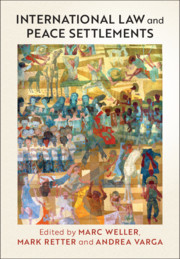Book contents
- International Law and Peace Settlements
- International Law and Peace Settlements
- Copyright page
- Contents
- Contributors
- Preface and Acknowledgements
- Case Law
- Peace Agreements and Instruments
- Abbreviations
- 1 Introduction
- Part I Historical Dimensions to Peace Settlement Practice
- Part II Peace Agreements As Legal Instruments
- Part III Key Actors and the Role of International Law
- 9 Non-state Armed Groups and Peace Agreements
- 10 Witnesses and Guarantors
- 11 The Security Council, Peace-Making and Peace Settlement
- 12 Peace-Making, Peace Agreements and Peacekeeping
- Part IV Representation, Sovereignty and Governance
- Part V Economic Aspects of Peace Settlements
- Part VI Humanitarian Obligations and Human Rights
- Conclusion
- Index
9 - Non-state Armed Groups and Peace Agreements
Examining Legal Capacity and the Emergence of Customary Rules
from Part III - Key Actors and the Role of International Law
Published online by Cambridge University Press: 14 January 2021
- International Law and Peace Settlements
- International Law and Peace Settlements
- Copyright page
- Contents
- Contributors
- Preface and Acknowledgements
- Case Law
- Peace Agreements and Instruments
- Abbreviations
- 1 Introduction
- Part I Historical Dimensions to Peace Settlement Practice
- Part II Peace Agreements As Legal Instruments
- Part III Key Actors and the Role of International Law
- 9 Non-state Armed Groups and Peace Agreements
- 10 Witnesses and Guarantors
- 11 The Security Council, Peace-Making and Peace Settlement
- 12 Peace-Making, Peace Agreements and Peacekeeping
- Part IV Representation, Sovereignty and Governance
- Part V Economic Aspects of Peace Settlements
- Part VI Humanitarian Obligations and Human Rights
- Conclusion
- Index
Summary
The increasing participation of armed groups in peace agreements, coupled with the relatively uncertain status of non-state actors under international law, raises a number of important but as yet unsettled questions. This chapter addresses three key issues. The first is the legal status of armed groups under international law. This has direct consequences with respect to the status of peace agreements, and whether they may be regarded as establishing binding international legal obligations or as mere political declarations of intent. The second is the designation of certain groups as ‘terrorist’, and the implications on their participation in peace processes. The third is the role of customary international law vis-à-vis the regulation of peace agreements. The focus of this component is on the potential role of non-state armed groups in the process of creating customary law. Of particular interest is the emergence of customary law regarding the inclusion of human rights considerations in peace agreements.
Keywords
- Type
- Chapter
- Information
- International Law and Peace Settlements , pp. 187 - 210Publisher: Cambridge University PressPrint publication year: 2021



